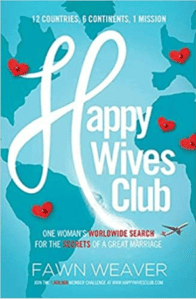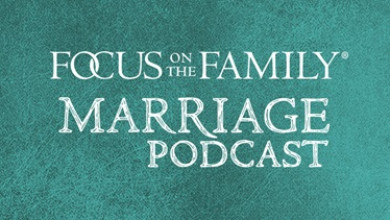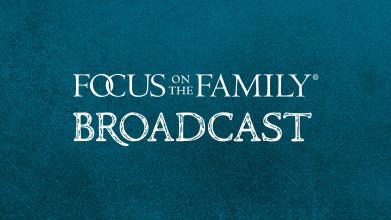Teaser:
Fawn Weaver: We should be the standard bearer for what a happy, loving, respectful marriage looks like. When the world looks at us, they should look at us and say, “That’s what I want.”
End of Teaser
John Fuller: Well, Fawn Weaver has some great insights today on this episode of Focus on the Family. Your host is Focus president and author Jim Daly. Thanks for joining us. I’m John Fuller.
Jim Daly: John, we met Fawn, uh, several years ago and her story captivated us. Um, the word overcomer is the best way to describe her. Uh, she had such a tumultuous, uh, past growing up in Southern California. She’s now a self-proclaimed happy wife (laughs) and she’s spreading the message of having a positive attitude when it comes to marriage. And it is so refreshing. Uh, the media and the culture tend to play up the negative aspects of marriage and it’s no wonder younger generations are asking themselves if they really want to get married.
John: Mm-hmm.
Jim: And of course, we say yes and yes. But when you hear Fawn’s message a lot of that negativity is debunked. And as believers, we want to live in a lifelong commitment with each other and do so with joy and happiness. And guess what, it takes energy and fuel to do that. And as we return to this program with Fawn Weaver today, uh, we’re going to give you some ideas on how to improve in that area and make the most of your marriage.
John: And Fawn is a popular author, blogger, a very successful business executive and entrepreneur and a marriage advocate, obviously. And she’s happily married to Keith and founded an online community called The Happy Wives Club that has over a million women participating and it’s dedicated to changing the tone of marriage. So, let’s pick up with this program as, Jim, you were asking Fawn about The Happy Wives Club.
Jim: Hey, uh, you speak to thousands, over one million, uh, woman, almost on a daily basis. Um, what are you hearing them say about marriage and the context of marriage?
Fawn: The comment I get the most is “Thank you for creating this, because I am embarrassed to share,” I literally just got this email. I … “for so long did not want to share with other people how great my marriage was because people think that you’re either-
Jim: (laughs) hm.
Fawn: … boasting or they think that, you’re trying to tear them down and really I just want to, a safe place to be able to speak positively about my marriage. And that didn’t really exist without this forum.” And the reality is is, yes, a lot of people have really bad marriages, but, hey, a lot of us have really good marriages and we shouldn’t have to keep our mouth closed while you guys are talking a million miles a minute. Right?
Jim: (laughs) Yeah.
Fawn: So, if those who are not having great marriages are able to say everything that is on their mind, why can’t we get that same benefit?
Jim: Uh, it’s a great point, especially again from Christ followers.
Fawn: Absolutely.
Jim: I mean this is the way it should be. And those that are struggling should get encouragement there-
Fawn: Yeah.
Jim: … to do things differently.
Fawn: Yeah.
Jim: I mean why stay in the rut of a broken marriage or an unhappy marriage, that’s not what the Lord has for you. What He doesn’t want is for you to divorce, He wants you to improve the marriage you’re in.
Fawn: Absolutely.
Jim: And to stick with it. Uh, you decided to take a trip around the world literally, uh-
Fawn: Yeah, yeah.
Jim: … which is, uh, interesting in and of itself. Why did you think you had to go to Asia and Australia and Europe and Africa to talk about marriage?
Fawn: I’m an overachiever. (laughs)
Jim: (laughs) I didn’t know this. (laughs) I mean.
Fawn: So, (laughs) so when, when I started The Happy Wives Club, it was literally, it wasn’t meant to be some big blog. People had to tell me what I had was a blog and they’d tell me, “You should be posting articles.” I’d say, “Why? This is just a club where I said I am happily married. My girlfriends are happily married. If Desperate Housewives and the Real Housewives of wherever you are and all these other wife show, if they don’t represent your marriage, if your husband isn’t a cheater and isn’t a buffoon like they show on T-, just post on here, I love being married. I am a happy wife. And let’s shine a positive spotlight on marriage.” That was it. That’s all it was meant to be. A bunch of women coming together to say, hey, this is a safe place to say my husband rocks and that’s okay.
Jim: (laughs) How many countries?
Fawn: Uh, well, at that time, it was only my four girlfriends.
Jim: (laughs)
Fawn: Right, that were all in a 20-mile radius and my mother-
Jim: Okay. Got to have Mom there.
Fawn: … who was also … gotta have Mom. So it was, it was basically those five.
Jim: But now today?
Fawn: 120-something countries, but we moved into 22 countries in, uh, less than four weeks when I first began and we were doing it by email, not by Facebook and all the social media stuff.
Jim: Wow.
Fawn: So girlfriends sending it to other girlfriends they knew who were happily married and just were tired of seeing how poorly wives were portrayed on television.
Jim: It’s actually amazing that, um, we’re okay aiming for the lowest common denominator rather than the highest.
Fawn: Isn’t it sad? Yeah, yeah. It-
Jim: You know, why not, why not talk about the good stories?
Fawn: Yeah.
Jim: Um, your worldwide tour, you ended up, uh, encountering and interviewing couples.
Fawn: Yes.
Jim: What did you find when you talked to these people and what were you looking for when you landed in Perth or in Tokyo?
Fawn: Yeah.
Jim: I mean did you just look for married couples you could talk to?
Fawn: Oh no. These were vetted married couples.
Jim: Okay.
Fawn: I, I, yeah, yeah, yeah, no. These weren’t people I found online.
Jim: Okay.
Fawn: So what I did is when I decided I wanted to share this message of happy wives around the world and what makes a marriage not just good, we know enough about what makes a marriage good, I wanted to know what makes a marriage great. And that’s what I set out to do. And I didn’t think that it was fair to just stay in the US because we experience different things in the US that are, uh, quite different, so what works here, I thought, would probably be different that what makes a marriage great in Africa or what makes a marriage great in Asia, or makes it great in Australia. I thought it would be pretty different. As it turns out, it’s the same.
Jim: Yeah.
Fawn: And if I hadn’t recorded all of it for proof, I don’t think anyone would believe me that there are so many couples around the world and they’re really following the same principles. So what I did is, as I was interviewing each couple, I would just sit with them over dinner or over coffee and I would just let them talk. I wasn’t guiding the conversation.
Jim: Right.
Fawn: But what I did to find these couple is I reached out to people that I personally knew around the world who I trusted and I said this is what I want to do. I want to show couples that have not just been loving each other for 25 or more years, but have been in love with each other for 25 or more years. Point me to that couple that behind closed doors, they are the same people they are in public.
Jim: Hm.
Fawn: And, so that meant that people were having to point me to those that were either parents or aunts and uncles, it had to be someone who was intimately a part of their circle. And here’s what was funny. It was not difficult to find these couples, because everyone knows a couple like this. And we all kind of look at them and just think they’re the unicorns.
Jim: Right.
Fawn: And the thing is is that if we spent more time around them, then maybe we could all be the unicorns.
Jim: Right, more like them, more successful in our marriages.
Fawn: Absolutely. And that was the goal. If I could tell the stories and I didn’t just interview wives, I interviewed both husband and wives, because I wanted to see a few things. One, I wanted to see how they interacted. That could not be told on a video or on paper. I wanted to see how they looked into each other eyes, how playful they were, what that dynamic was. And I have to tell you around the world, no matter where they were born or their background, what makes a marriage great is the same.
Jim: Yeah, it’s so true. Uh, you could relate to this story. In 1992, we started the international division here at Focus on the Family. For years people had written to us saying, “Can you bring Focus to our country?” And we’d send back a polite letter saying no. (laughs)
Fawn: (Laughs)
Jim: Basically. But finally in 1992, uh, the board and Dr. Dobson agreed to start the international division, so we, uh, went on trips around the world, two or three of us, Peb Jackson was the vice president at that time. And I remember going to Kenya and I sat with Dr. Lillian [inaudible] who was a psychologist in Kenya and she and I had lunch and I said, “you know, Lillian, we’d like to go global with Focus, but do you think it will be relevant?” And she laughed and she said, “Well it’s like an American to think you invented the family,” which I thought was a great line.
Fawn: (laughs) I love it. I love it.
Jim: And I laughed, I said, “fair enough.” But she said, “As long as you’re sticking to marriage and parenting-
Fawn: Yeah.
Jim: … it’s the universal language.”
Fawn: Absolutely.
Jim: And she told me that in ’92 and you’re really validating that.
Fawn: Yes.
Jim: That whether you’re in the Philippines or South Africa or Europe, guess what, husbands and wives-
Fawn: Yeah.
Jim: … moms and dads struggle with virtually the same stuff.
Fawn: Absolutely.
Jim: Whether you’re in a village, a rural village or you’re in the big city of the world, it’s all the same.
Fawn: Listen, one of the couples I interviewed was an arranged marriage from India.
Jim: Okay. How’d that go?
Fawn: It went fantastic, because they decided after the arrangement, they didn’t want to have marriages like their parents, where they didn’t really like each other. They wanted to figure out how do we like each other. So we started off with the I do, and now how do we figure out if we’re going to be together for the rest of our lives, how do we really enjoy this. And what I loved about the husband, Abraham, is he said something that every man before him, every husband before him said, and he said, “I respected her from the beginning.” Now, understand, in arranged marriage he doesn’t have to do that.
Jim: It’s not a choice.
Fawn: It’s that he does not-
Jim: He’s got the girl. Right.
Fawn: He’s got the girl and everyone would support him demeaning her. I mean that culture is not … at least in the time they got married, it’s getting very different now, but at that time, the man completely ran everything. And he looked at her and he said, “What makes our marriage different from all the other arranged marriages, is from the beginning, I respected her.”
Jim: Huh.
Fawn: Yeah.
Jim: That made a difference.
Fawn: Yeah.
Jim: In fact, you talk about another story. I think it was, uh, Bonnie and Jerry-
Fawn: Mm-hmm.
Jim: … that you came across. What country were they in and what was the, uh, kinda the ah-ha you had with them?
Fawn: Yeah, they were in Winnipeg, Canada, and you know, Bonnie and Jerry, it was very interesting looking at their relationship, because one, they’re the only ones that I interviewed that did not have children because again, I was interviewing couples that were married 25 years or more and they chose from the beginning not to have children.
Jim: Huh.
Fawn: What I loved about their relationship is they … one, they knew who they were and they wanted to help each other in life from the beginning. So he was a postal worker, didn’t enjoy his job, so he really wanted to retire early. She was getting her degree in accounting and wanted to be a CPA, so they began on this journey side-by-side and said, “All right, how do I help you?” And “How do I help you?” And “How do I help you?” And they were able to both achieve their dreams together by working together. So he made this one joke that at one point when she was doing her, getting her CPA degree, the way that he helped is while she would do things like cooking and things like that, he would read the books to her.
Jim: Ah.
Fawn: And he said it was the most boring thing he had ever done in his life, but he was committed to helping her get her degree. And I tell people this all of the time, when it comes to success, the thing that I learned about from interviewing all of these couples is that couples have a built in advantage when they are on the same team, when they are playing this field together.
Jim: Hm.
Fawn: And you … for a single person, you kind of have to figure it out all on your own, you have to figure out who you can trust, but when you are with someone and you already have that worked out, you’re able to get twice as much work done. So for all of these couples, interestingly enough, they were all successful but none of them began their marriage that way and none of them were given anything.
Jim: Yeah.
Fawn: They earned it together.
Jim: Yeah, that’s such a great analogy of being on the field and on the same team on the field.
Fawn: Yeah.
Jim: ‘Cause that’s when sports analogies and that’s when sports breaks down, right, when you’re not working together.
Fawn: Yeah. Yeah.
Jim: It’s true in marriage.
Fawn: Yeah.
Jim: You had a story from a taxicab driver in Mauritius. What did he say?
Fawn: Yes. Yeah, he said, [foreign] is the secret to a happy marriage.
Jim: (laughs) What is that?
Fawn: You get what you give.
Jim: You get what you give.
Fawn: You get what you give. And so if you want love, you give it. If you want respect, you give it. Whatever it is that you truly want is what you give.
Jim: Let me ask you this. When you, when you say that, um, these are universal human truths-
Fawn: Yeah.
Jim: … the irony is they’re also rooted in scripture.
Fawn: Every single one.
Jim: We’ve got to be very bold and blunt about that. God has designed all this. God has placed this here. We’re made in the image of God. And that’s where we Christians will make that connection to say that’s why these things are true no matter what culture you’re in. These are basic human truths because they’re rooted in God’s character, right?
Fawn: Absolutely. We should be the standard bearer for what a happy, loving, respectful marriage looks like. When the world looks at us, they should look at us and say, “That’s what I want.” Right now the issue that we have is, nobody wants what we have, and that’s a problem.
Jim: That should be a signal.
Fawn: That should be a signal, right? And if we can put the same thing that I have had the pleasure of doing with The Happy Wives Club is putting this positive spotlight on marriage, but keep in mind, this isn’t just Christian. This is people all around the world from every background, but really truly it is Christian couples that should be the standard bearer for what it’s like, because Christ laid it out for us. Paul laid it out for us. He told us, this is what is going to work. This is how you can be successful in marriage and boy, I don’t know, we just ignore it. (laughs)
Jim: No, yeah, it’s true. To our peril.
Fawn: (laughs) We just ignore it to our peril. There is nothing in this book, and I tell people this all the time, there is nothing in this book earth shattering. What is in this book are things that you already know. They are things that you should already be doing, but likely have chosen not to do. And so it’s really a reminder by looking at all of these couples around the world and taking this journey with me, it’s really a reminder of what makes a marriage great and how to apply those things to your own.
John: Fawn Weaver is our guest today on Focus on the Family with Jim Daly and, uh, the book we’ve referred to is Happy Wives Club: One Woman’s Worldwide Search for the Secrets of a Great Marriage. And we’ve got copies of that for you at focusonthefamily.com/broadcast or call 800-A and the word FAMILY. 800-232-6459.
Jim: Fawn, you were in the Philippines, uh, we are talking about the connection with God. You met a couple there that said he’s the most important aspect of the marriage relationship. This is Ben and Gloria. Um, and I think they taught you that you’ve got to put God first.
Fawn: You know, that was a pretty common thing. Now, here’s the thing, and we’ve already said that I was speaking to people of different religions. The thing that was common across the board and especially with the couples, the majority of them were Christian couples. God being the … at the top is what was most important. I think one of the places that we get in a little bit of trouble with marriage that none of these couples were in, is that we want to put God first and then we want to decide if the husband or the wife comes second or third and we want to kinda go down this line.
Jim: (laughs)
Fawn: And that’s just not the way that these couples operate. You had God first and then you had husband and wife side-by-side, working together to make life great, to raise their children in the best way they possibly could. So I think that that triangle is what was shown with every couple.
Jim: Hm. No that is good. Uh, you also met Barb and Doug in Australia.
Fawn: Ah.
Jim: They, uh, tipped you off to a good, great marriage, uh, idea in principle. What was it?
Fawn: Let me tell you something about Barb and … because it’s happened since I left. She was in the beginning stages of ALS when I was there and when I was doing that interview, and since then, she has now been in a wheelchair and you’ve seen her go down pretty quickly and I stay up with her and, and Doug and her children and friends who are all on Facebook, so I’ve been able to watch this, and to watch this man care for her.
Jim: Hm.
Fawn: It is the most beautiful thing you ever want to see. And so when I look at different couples, what I think about is man, when I am 70, when I am 80, who do I want to be there by my side helping me through any challenges I might have through life, and for me, that’s hands down Keith. So the way that I handle my marriage now is beginning with the end in mind.
Jim: Huh. Boy, that’s, uh, powerful to think of it in that context. Um, we had, the interim president of Focus, Don Hodel, you remember, John.
John: Mm-hmm. Yeah.
Jim: Don’s wife Barbara tripped on the staircase, tumbled to the bottom, pinched her, uh, spinal cord and she was quadriplegic and so for the last, uh four or five years of Barb’s life Don had to basically do everything for her. And he wrote, um, and blogged about care-taking of his wife in that condition and it moved a lot of us to tears. I mean that was unconditional love.
Fawn: Yeah.
Jim: And to see that kind of caregiving and that ability and willingness to do it in their 70s-
Fawn: Yeah.
Jim: … was profound and quite moving.
Fawn: Yeah.
Jim: And, uh, he lost her, uh, a while back and, uh, but that … to see that kind of love, um, that’s where the rubber meets the road.
John: Yeah, Don’s devotion and his tenderness toward her were so, um, uplifting and inspiring.
Jim: Hm. And that’s what you saw and are seeing in Doug and Bonnie.
Fawn: Yeah, absolutely. And the, the likelihood is that they had a great friendship before that period of time.
Jim: Hm.
Fawn: So him taking care of her, it is his honor. And friendship is so … it was one of the other, really the other pillar of a great marriage as I traveled. These folks were friends. They laughed together, they played together, they joked together, they did not take themselves that seriously.
Jim: Yeah, that’s-
Fawn: It was just like oh my goodness, life is hard enough without making marriage hard.
John: (laughs) But how … in light of that though, uh, Fawn, in light of how hard marriage can be and, and life can be, how do you cultivate those friendship moments?
Fawn: I think one of the things that is you look at life as being hard and don’t look at your marriage as being hard. You look at the outside world and say, “How do we keep them out?” One of … When my husband calls me, the song that plays on my phone is something by the Dixie Chicks called Easy Silence, and the line in it says, “The easy silence that you make for me, keeping the world at bay.”
Jim: Mm-hmm.
Fawn: And that’s that he does for me is keep the world at bay and really I look at marriage and all of these couples look at marriage as their safe zone.
Jim: Hm.
Fawn: It’s the one place in the world that you actually have control of the environment. Nowhere else can you have that. And so in your home, if you want to create a home of peace, a home of serenity, a home of tranquility, you have the power to do that.
Jim: Yeah, and that, that is a good word. In fact, you and Keith, you use an acronym AEOD.
Fawn: Yeah.
Jim: What is it?
Fawn: Accept each other’s differences.
Jim: Okay. Why is that so hard for us to do?
Fawn: You know, I don’t know. Because it was a friend of mine said when reading this, she said, “I love this because when I look at different couples and they argue and one want one to be like the other and the other,” she says, “if two people are identical, then one of you is unnecessary.”
Jim: Right.
Fawn: And that’s what I look at when I look at these different couples. When you accept each other’s differences and don’t try to change the other person or cause them to respond to you the way that you would respond to you, you’re excepting the fact that the two of you are different by design.
Jim: Yeah.
Fawn: And that is okay. And really are you so great that you want everybody to be like you, that you want your spouse to be just like you? Are you that awesome?
Jim: (laughs)
Fawn: And, you know, maybe it’s just me, I don’t think I’m that awesome that I want my husband to be made in my image.
Jim: (laughs) Aw, that’s good.
Fawn: Right.
Jim: That’s a challenge right there.
Fawn: Yeah.
Jim: You were brave enough to say to Keith at, at some point in your marriage, you can give us the timeline of this, but you said, “Keith, on a scale of one to 10, how am I doin’?”
Fawn: Aw, (laughs).
Jim: Now, no husband wants to answer that question.
Fawn: Oh. (laughs)
John: No win kinda thing.
Jim: That was naughty, that was naughty of you to even say it, but he came back with an answer that didn’t please you much.
Fawn: No, and, and this was actually, I was in Australia when this happened, and the reason why I wanted to know the answer to that question, listen, maybe that is not for everyone. I only speak on my own behalf. You can do what it, with it, what you will, but for me, I didn’t want to think that I was a 10 and my husband thinks in terms of how I am as a wife to him, I’m a five. I didn’t want a five-point difference there. (laughs) And I am strong enough to be able to take feedback. We want feedback in every area of our life.
Jim: I thought you responded well. But tell us the exchange and how he said it and what he said and how you responded to it.
Fawn: Yes. I asked on a scale of one to 10, with 10 being the best wife I could be, this is not comparing me to anyone else, 10 as the best I could possibly be, where am I right now, and boy, did he hem and haw.
Jim: I bet he did (laughs) stall for time no doubt.
Fawn: Oh. And we were on Skype because I’m in Australia.
Jim: Yeah.
Fawn: And he just did not want to answer that question. I said, “Honey.”
Jim: That’s when you start saying, “I can’t hear you, honey, can you speak louder?”
Fawn: (laughs) and, and, listen, he wouldn’t answer the question. He said, “Can I think about it?” Now, that should have already tipped me off, right? Can I think about it? And I … once I asked the question and he didn’t answer, so for a few days, and finally I went back and I said, “Honey, what is the answer?” And then he went through this process of, “Well, if you compare yourself to so-and-so, you’re 100. If you compare yourself …” I said, “No, no, no, no. I already know they’re really not great wives. (laughs) That’s not what I’m asking you. I already know they nag like crazy, that’s not the question. The question is, is with a ten being the best I can be, where am I?”
Jim: Uh-huh.
Fawn: And he said, “I would say you’re a seven.” Can I tell you no wife wants to hear they’re a seven?
Jim: Right.
Fawn: And at the time, if you would have asked me the exact question, I would have told you I was a nine.
Jim: Now did you hang up or did you …?
Fawn: (laughs) No, I … no, I, you know, and again, this is, this is a grown-ups table, right?
Jim: Right.
Fawn: Marriage is a grown-up thing. You have to be able to take feedback and not lash out. If you ask the question, you have to be able to receive it. And so I asked the question and so my next was, “Please give me a list of the six things that I can do to increase my score, to get close-
Jim: See, I think that’s incredible.
John: Not one or two, but six things.
Fawn: I told you earlier, I’m an overachiever. Right?
John: You are. Right.
Fawn: So, I wanted to know-
Jim: Wow.
Fawn: … six things that I could do to get closer to being the best wife I could possibly be. Again-
Jim: Do you remember a couple of those?
Fawn: I … Well, you know what’s funny?
Jim: Not to be too personal here.
Fawn: Oh listen, you know me, you can ask anything. One of them, the very first one that came very quickly from him, was “Honey, sometimes you think and speak simultaneously.
Jim: (laughs)
Fawn: It would be helpful to do one before the other and thought would be the better one to go first.” And so I thought it was going to be all these things like, you know, like it would be really nice if you cooked more or it’d be really great if you cleaned up a little bit more. I thought it would be those “wifely” duty things that people speak about so much, but really all the things that he wanted from me are things that I truly should have wanted for myself.
Jim: Hm.
Fawn: And they were all things that would make me a better person. Not spending as much time on business and reaching out to friends and family, actually showing other people that I care, those were the kind of things that were on the list. But that top one was learning to speak after I have thought through. (laughs)
Jim: (laughs)
Fawn: I’m still working on that by the way.
Jim: That’s a great discussion though. That’s a really healthy one. And I give you credit for responding well. I know you asked the question, but I would say in 90% of marriages, uh, popping that question leads to an argument or a fight.
Fawn: Yeah. W- w- well, let me tell you, and this is the beauty of that question, is while he was writing down his six things, I wrote down 12 I thought could possibly be on his six.
Jim: Huh.
Fawn: Can I tell you how many were on there?
Jim: Yeah.
Fawn: One.
Jim: Really.
Fawn: So if I, by my own devices, had decided I want to try to be the best wife I can be, so I’m going to do all these 12 things, 11 of them wouldn’t have mattered to him.
Jim: Ah.
Fawn: That’s why the question is important.
Jim: Yeah, that, that is so powerful. Uh, Fawn, this has been really great and I’m glad that you took that challenge to say let’s talk about great marriages, let’s stop letting media define what marriage is like, the drudgery of it. And many of us do have good marriages.
Fawn: Yeah.
Jim: And I’m grateful for it. Thanks for being with us.
Fawn: Thank you for having me.
John: Well, Fawn Weaver has such a heart to share positive messages about marriage and that certainly came through on this episode of Focus on the Family. And I trust that you’ve been inspired to look for the best in your spouse.
Jim: Well, I hope so too, John. This is why Focus on the Family exists. We want to uphold marriage and provide you with the tools you need to have a thriving relationship with your spouse. And we have lots of resources to help you in that area, like our free online marriage assessment. I think over a million people have taken that. It just takes a few short minutes. Uh, you’ll get a solid overview of what’s working well in your marriage and some areas you might want to concentrate on.
John: Mm-hmm.
Jim: We also have Fawn’s book, Happy Wives Club: One Woman’s Worldwide Search for the Secrets of a Great Marriage. And when you donate to the ministry of Focus on the Family today, and a gift of any amount, we’ll send you a copy as our way of saying thank you for helping others in their area of need.
John: And you can donate and take that marriage assessment, get your copy of Happy Wives Club, all the details are at focusonthefamily.com/broadcast or call 800-the letter A and the word FAMILY, 800-232-6459. Well plan now to join us tomorrow as we have a really powerful story of forgiveness, uh, between an abortion survivor and her biological mom.
Preview:
Claire Culwell: And it changed my life forever as she told me about being pregnant with me at 13 years old and that I had survived her abortion procedure that was meant to end my life.
End of Preview




















